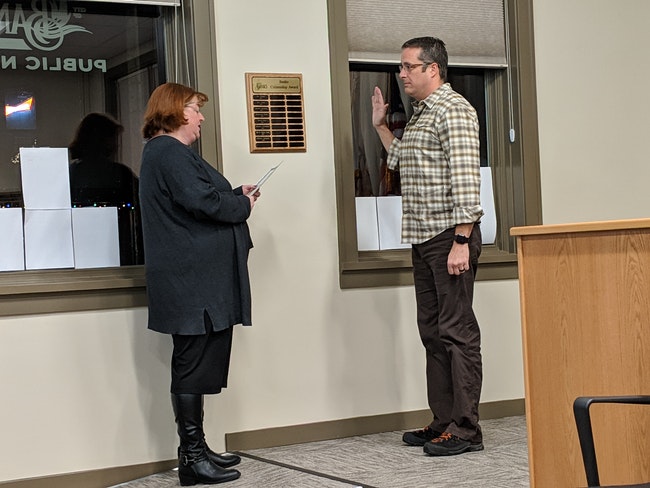While the world looked on in shock as Russian troops invaded Ukraine in late February, Mark Gregg, a Banks resident, firefighter with Hillsboro Fire & Rescue and current Banks city councilor, flew to Poland with three other Empact Northwest volunteers to help manage the refugee crisis that was unfolding on the border, about a three-hour drive from Krakow.
Gregg was part of a group of four volunteers, led by Empact Northwest Director Jake Gillanders, that was in the air and on the way to Poland within 24 hours of the Russian invasion to determine the needs of some of the millions of Ukrainian people fleeing the war.
“Our initial job was to make connections and figure out the lay of the land, so to speak — figure out people’s needs,” Gregg said. “We assessed the Polish border crossing’s reception centers that were set up. Most (refugees) were in groups of at least two or three people. There were no cars, or transportation, or anyone waiting for them to help them try to find a place to stay. Most people stay in those areas anywhere from 12 to 48 hours to two or three days, and some people coming over need medical care because they don’t have their medications and haven’t taken them in days.”
Empact Northwest has been around since the catastrophic, magnitude 7.0 earthquake in 2010 that struck Haiti. The mission to Ukraine is the seventh time Gregg traveled with a team to a disaster area to help mitigate the affected people through aid and relief.
The NGO’s (non-governmental organization) current mission is to train firefighters and paramedics in preparedness response and provide a means of travel around the world with a primary focus on the Caribbean, Gillanders said.
Most of the Kingston, Wash.-based nonprofit’s work, funded entirely by donations, is medical response and rescue in acute disasters, which need to be robust, and Empact Northwest’s rapid response model allowed the four-person team to get out the door quickly and in the air within 24 hours of the Russian invasion.
Once in Poland, they worked in Rzeszow to make contacts with local governments — cities and mayors — to find out how American nurses and doctors can help and operate legally, different from how they would respond to a disaster scene because life for many in Poland, but especially its governmental systems and laws, continues unabated.
“People want NGOs like ours to hit the ground running,” Gillanders said. “When we first put what we call a pathfinder team on the ground we see the truth of what’s needed. Things that look true on a map and in news reports often don’t look as true on the ground. (In Poland), the biggest thing we misunderstood was geographically, we didn’t fully appreciate how long it takes to get from Krakow to the border. Three hours sounds like one thing but when you have to do that every day you realize the logistical impact for oncoming teams.”
Gregg said the reception centers at the (Korczowa-Krakowiec) border crossing also held a much larger-than-anticipated volume of people, with many other NGOs telling Empact Northwest’s team they were getting ready, but once there, they realized there were not a lot of volunteers on the ground.
The team hired a local interpreter — the daughter of a friend’s cousin sort of situation, and a former exchange student in Colorado Springs, Colo. — a Ukrainian university student in Krakow, who speaks Polish, Ukrainian, and English, to help them navigate the mission.
Yaryna Peretyatko, 22, is a chemistry student at Jagiellonian University in Krakow, who has lived in Poland for five years and whose family lives in the western Ukraine town of Lviv, which is a little more than seven hours from the capital city, Kyiv.
She said that when she first answered the call to assist incoming NGOs she was scared and stressed, and when she arrived at the first reception point the realization of Putin’s war hit her.
“I saw people actually from my country — people who are just like you — who left their nice homes and apartments, with only small bags or backpacks with everything they could get packed in there and without documents or passports or anything,” Peretyatko said. “It’s hard to imagine leaving everything behind and going to a foreign country where the language is different without knowing anyone there and trying to figure out what to do next.
Where to even start. Where to live, how to work, how to just survive. It’s my country and it’s really hard to accept the fact that this is going on.”
She said that one of the most shocking revelations was seeing that all of the people at the reception centers are mostly women and children — fathers and husbands and brothers and sons remain in Ukraine because men can’t leave the country anymore, asked instead by Ukraine President Volodymyr Zelenskyy to take up arms against the Russian invaders.
On March 26, Russian rockets hit an oil depot in Lviv. Peretyatko said her family “is still safe but things don’t look too good.”
“They are worried about everything,” she said. “My aunt moved to Poland and wants to go back but she has two small children and it’s too dangerous to be there now.”
Gregg said seeing that Ukrainians fleeing to Poland “are just regular people” hit him hard and that he feels proud that he was able to help people feel safe and try to figure out what to do next.
Asked what stays with him since coming home to Banks, Gregg said, “The pictures on TV and in the media don’t do justice to the amount of chaos and confusion going on in those reception centers. There are thousands and thousands of people being moved through daily, and at the same time, they’re all women and children and (the) elderly. There’s a lot of desperation with people who have only what they could carry and not knowing where they’ll end up. I did see a huge effort from the Polish people to take care of refugees coming over. People opened their homes. At some point that local volunteerism is going to be overwhelmed and worn out and the international community will need to step in.”
Anyone wishing to donate to the relief efforts, or who wishes to volunteer, can do so through Empact Northwest. To find out more visit the organization’s website at https://www.empactnorthwest.org.
A number of other ways to help Ukrainian citizens can be found online at https://bit.ly/3DqH3yT.






